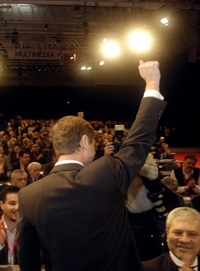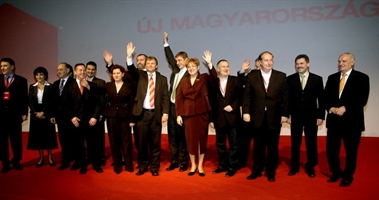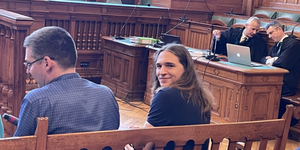On one side of Dozsa Gyorgy ut, by the market, pedestrians are forced to avoid people hawking knock-off batteries, homeless people and invalids stumbling along. Poor people are crowding around to buy cheap consumer goods. It's a kind of introduction to the country for beginners. The introduction continues on the other side of the road, but here, the lesson is different. The prime minister and party president is outlining a vision of a progressive, civic Hungary and is giving a multimedia presentation in the Syma Hall, which is surrounded by a heavy police presence.
 © Stiller Ákos |
J. Zoltan Gal, who chaired one of the sessions, stepped out of his role to summarise the results of the discussions. He said delegates had showed that the party was united and continued to have unbroken confidence in its leader. Superficially, he seemed to be right. The winning candidates for party office won solid victories. Gyurcsany himself won 90 per cent of the votes cast in the party leadership election. At the debate preceeding the vote, nobody seriously criticised the prime minister or the coalition, and nobody demanded a change of direction for the party. Most of the speeches echoed the Gyurcsany line, largely calling for "the same thing, but better." Yet the prime minister and his team did not succeed in getting their "modernisation" measures passed - a set of amendments to the party constitution. It is also significant that Jozsef Sipos, a key figure in the anti-Gyurcsany social policy workshop was re-elected to the party council with a clear 70 per cent of the votes.
And more than a few speakers delivered personal warnings to Gyurcsany. Gyula Horn, the former prime minister and party leader, made perhaps the least ambiguous comment. He said: "Sorry, but we are in serious trouble. The difficult situation is not the sole fault of the government, the party shares some of the blame. We don't speak to people in the way they deserve to be spoken to. By themselves, the reforms won't bring us 70 per cent of the vote in the 2010 elections. We haven't done all we can to stop 'them' from winning in 2010. Feri, you certainly can't be accused of over-emphasising community work. You can't fight without us, and we can't fight without you. Churchill didn't promise blood, sweat and tears alone - he also promised victory. Promise us victory, Feri!"
'Feri' didn't do this. He couldn't have. After spending cuts, and uncertainty resulting from the reforms, amidst plummeting opinion poll ratings, domestic political confusion and local election losses, and more than three years before the elections in question, it would be pointless to talk to the party faithful about another victory. But the party membership's dismay was unmistakeable. It was as if the delegates had only just now realised that there were no alternatives, and the constant political tension was causing them to become frustrated. In vain the prime minister insisted that the question was not Gyurcsany or Orban, since in the eyes of public opinion, the question really is just that. Comments addressed to Orban attracted the loudest applause. And the the prime minister himself set the scene for this, with his theatrical insistence that he would only remain in his post as prime minister and party leader if he won 75 per cent of the party's votes. What was a delegate to think, given that Gyurcsany had manoeuvred his way into becoming the sole candidate for party leader, and was now expecting a guaranteed vote for 'Feri'? Who else could he vote for when the ballot paper listed only one name and there was no opportunity to reopen the nominations?
Second part of the article (Oldaltörés)
This party congress reached no conclusions and offered nothing new. It was a transitional congress. The party leader now officially leads the party, the broader leadership has hardly changed, and the constitution remains the same. Once again, the party has shown commitment to spending cuts and reform.
 © Stiller Ákos |
The one source of excitement was the way Katalin Szili emerged publicly as an opponent of the Gyurcsany line. In an article in the left-wing daily Nepszava she launched a left-wing "system-correcting" manifesto. But since she didn't stand for a single party post, it is not clear how much support she enjoys. In any case, Gyurcsany's passionate speech on Saturday was a withering attack not just on Orban and Fidesz's policies but on Szili's ideas as well - even if he did not mention her by name. After the speech, Szili left the room, and she didn't turn up on Sunday either.
Nothing is certain in politics, but Szili can hardly be an alternative to Gyurcsany, and if the Socialist leadership stands alongside Gyurcsany, then the leader of the house certainly will not take the party reins.
We said earlier that nothing new was seen at the congress. Two things are nonetheless worthy of comment, although they were not wholly unexpected. One was that Gyurcsany called on the forces of the Left (the Socialists and the Free Democrats), but also on the Hungarian Democratic Forum, who "follow the noble traditions of Hungarian conservatism", to stand up for "national progress." The prime minister is seeking to isolate Orban's radically anti-government Fidesz from all other parliamentary forces. The poisonous relationship between Orban and Forum leader Ibolya David and their two parties makes this easier for him. But his courting of the Forum also serves as a warning to his coalition partner: "if you don't make an effort, you can be replaced." For, though it wasn't the main theme, several speakers who had personal conflicts with the Free Democrats spoke critically of the junior coalition partner. Many mentioned healthcare reform "which would otherwise be worth implementing". Gyurcsany would certainly have no qualms about dumping his coalition partner if internal party needs dictated thus.
The other novelty is that Gyurcsany has taken his burning desire to confront the past and break with the Kadar tradition from the Liberals. His essay Confronting the Past argues that a choice must be made: Imre Nagy or Janos Kadar. He took this idea further in his Saturday speech, though he was certainly not speaking primarily to his 32,000 party members, most of whom, just like Gyurcsany, "began their public careers" in the Hungarian Socialist Workers' Party.
"However you look at it, Janos Kadar will not fit into the world of Hungarian traditions. We have to see the difference," he said on Saturday. And he explained why it was necessarily to break finally with the past. "The reason we must see the difference, is that there will be a debate over the years to come over whether people who have nothing to say about what happened between 1956 and 1989 have anything relevant to say about national progress and democracy."
 © Stiller Ákos |
There's no way to know if Gyurcsany will manage to bring about such a huge change in his party. It would be extraordinary if he did it while the Socialists were in their current mood. Ivan Vitanyi may have labeled the Kadar era a feudalistic time, it is no coincidence that it was Gyula Horn who asked Gyurcsany not to open up any new fronts. And even Ildiko Lendvai, a Gyurcsany loyalist, thought it important to add: "Feri, it's not about our assessment of the Kadar era."
Gyurcsany genuinely wants to renew his party and create a modern, western-style party out of a Socialist Party that is creeking at the seems. There is a new headquarters, and the party's move from Koztarsasag ter is a symbol of this change. But the party needs a new model.
"We need to renew left-wing politics, following the noble traditions of national progress. The Left respects the great figures of our past: Istvan Szechenyi, Lajos Kossuth, Ferenc Deak, Sandor Petofi, Mihaly Tancsics, Leo Frankel.....," Gyurcsany said in his Sunday speech. It's an illustrious list, and it largely agrees with a list the Free Democrats came up with shortly before the 1989/90 regime change.
So Gyurcsany wants to continue what he began, and he wants to free his party from its "accursed inheritance", making it attractive to younger generations and the middle classes. He became party president because he did not want to end up like Peter Medgyessy, who feel victim to the grand old men of the party. He knows he has to be there in the party headquarters. Otherwise, he can't control what happens. The party is not his target. If he fails as prime minister, he'll leave the party. He wants to govern, and he is happy to subordinate his party to that goal. The question is how much time his party will give him.
Zsolt Zádori
















